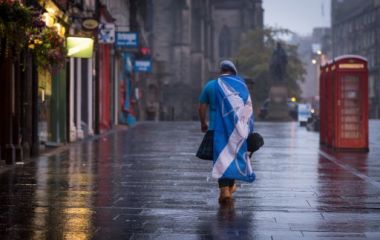Gordon Brown draws on Ecclesiastes in heartfelt plea for unity in Scotland

Emotions are still running high in Scotland days after a narrow majority voted to keep the country in the United Kingdom.
Independence was rejected last Thursday by 55 per cent of the population to 45 per cent, with all but four of the 32 Scottish council areas voting No.
Defeat for the Yes campaign was quickly followed by Alex Salmond's dramatic announcement on Friday that he would be stepping down as first minister.
In Glasgow, which voted Yes, police were called in to separate rival groups of independence and union supporters on Friday when the mood in the city's George Square threatened to turn ugly.
But elsewhere across Scotland the mood has been reflective as Yes and No supporters alike digest the result and get to grips with the new questions arising out of the transfer of more powers to Scotland.
While No voters breathed a sigh of relief at the outcome of the referendum, many Yes voters were deeply disappointed and will be closely following the negotiations with Westminster.
The desire of Yes voters and even many No voters is for a quick follow-through on the pledge of further devolution from the three UK party leaders.
Gordon Brown, a key figure for Better Together in the final days of campaigning, has put forward a plan for devolution that has the support of David Cameron, Nick Clegg and Ed Miliband.
In a speech delivered today in Dalgety Bay, Fife, Mr Brown said the three leaders had signed a resolution on a timetable of action that includes drafting legislation for a new Scotland Bill by the end of January 2015.
Further points on the timetable include a debate in the House of Commons on 16 October to ensure progress is being made on devolution, and the publication a few weeks later of a "command paper" detailing which new powers are to be given to Scotland.
"We will lock in today the promises that we have made," said Mr Brown.
Mr Brown quoted extensively from the Book of Ecclesiastes as he issued a call for unity.
"If my father [a Church of Scotland minister] had been speaking today he would have referred to a biblical text," the former Prime Minister said.
"There is a time for everything. There is a season for every activity under the heavens. There is a time to tear down and a time to build. There is a time to tear up and a time to mend.
"The Bible says there is a time to kill and a time to heal. I would prefer to put it this way and I think this is where the country stands now: There is a time to fight but there is a time to unite and this is the time for Scotland to unite and see if it can find common purpose and move from the battle ground to the common ground and let us seek to find high ground in trying to find a way forward for the future."
Although the months of campaigning are at an end and the referendum is over, the conversations are continuing in pubs, churches, on social media and around the dinner table.
There has been some concern over community relations and accusations of excessiveness have been levelled at supporters on both sides.
Church leaders were quick to call for unity in hours following the referendum declaration, with the Moderator of the General Assembly of the Church of Scotland, the Right Reverend John Chalmers, appealing to Scots to work with one another and move the discussion on from "us" and "them", to one that speaks only of "us".
He urged the winning side to "avoid triumphalism" and show understanding towards those who feel anxious or down following the referendum.
"Let's take heart from the fact that the people of Scotland have shown in overwhelming numbers they are ready to discuss their future aspirations," he said.
"Let's keep it that way and not hand the game back to the professional politicians to do it all for us."
Mr Chalmers will be preaching the sermon at a service of unity taking place in Edinburgh's St Giles' Cathedral on Sunday morning, in which he will expand further upon the message he shared on Radio 4's Thought for the Day on Friday.
"It will take a force of magnanimity and graciousness to find a way of harnessing the energy of opposing sides and bringing it to bear on a shared future," he said yesterday.
"There is, however, an extraordinary opportunity here; for, when the parties to any dispute decide that it's time to move on; and particularly when those who have been opponents decide to pool their resources and work together - then something extremely powerful can happen."











